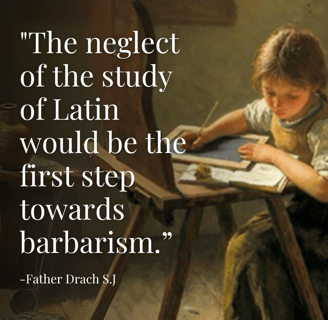The Importance of Latin
Ursuline Method of Education-1946


Latin, the language of the age of Augustus and of the Roman world, the mother tongue of most of the modern languages, has become the language of the Church and of the Catholic world, the language of faith and of liturgy and, consequently, the language of European and universal civilization, the language of all moral, political, philosophical, historical, physical, and mathematical sciences. Latin is the language of European and universal civilization.
The study of classical languages, of Latin especially, was the great bulwark used by our ancestors in the Middle Ages to protect letters, science, art, and history against the destruction of barbarism. The Latin classics were discovered, preserved, copied, annotated, and explained, as proclaimed by Leibnitz and conceded by all Protestantism, in the monasteries of the Middle Ages. At that period, Latin was the language of learned men in all European countries. The rugged, noble, scholastic Latin of the masters of Catholic theology has done immense service to truth and to science. After these men, a less happy era intervened, but it was short, and it is to be remarked that Dante and Petrarch, who were the first among the Italians to give expression to their genius in their own language, wrote extensively in Latin.
In the middle of the fifteenth century, after the fall of Constantinople, Latin literature appeared with a new luster. Doubtless, literary taste and, what is more serious, religion and virtue have more than one reproach to aim at the poets and literary men of the Renaissance. Despite this, we must recognize their effort to bring about a revival of the language of the age of Augustus in its primitive perfection. Once again Latin crossed the Alps and was received enthusiastically.
Christian Europe found new savor in the beauty of Latin and new admiration for the great literary ages of the past; Christian Europe revived its zeal for the reading of the Fathers of the Church and enthusiastically studied the doctors of scholastic theology. Latin was once more called the language of letters and of Christian civilization, "the common and necessary tongue of all cultured men," according to Dupanloup. He adds, quoting Father Drach, S.J., "the neglect of the study of Latin would be the first step toward barbarism."
